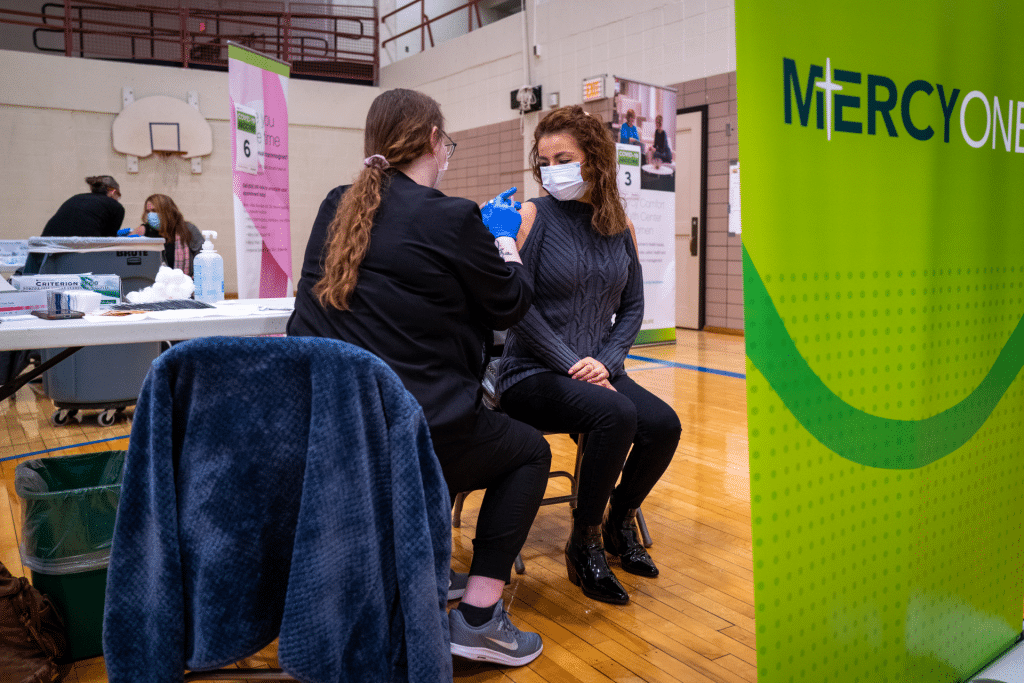Amid a public health crisis, the Supreme Court could be poised to stop Biden’s vaccine mandates
By James G. Hodge, Jr., Leila F. Barraza, Jennifer L. Piatt, Erica N. White | December 10, 2021
 A school worker in Des Moines, Iowa, gets a COVID-19 vaccine. Credit: Phil Roeder. CC By 2.0.
A school worker in Des Moines, Iowa, gets a COVID-19 vaccine. Credit: Phil Roeder. CC By 2.0.
The rapid development of safe and effective COVID-19 vaccines in less than a year stands as a shining achievement of science and government initiative. The shots have already spared hundreds of thousands of lives in the United States alone. Yet, while they are in plentiful supply here, getting them into the arms of all who are eligible is proving harder than anticipated.
As the pandemic enters its third year, the nation’s health, security, and economy are all on the line, and wider uptake of vaccinations is critical to escaping the grip of COVID-19. Throughout the delta variant-driven wave, infections, hospitalizations, and deaths were fueled largely by the unvaccinated. The pandemic is not over. Now the country is bracing for the impact of the omicron or other variants which may lead to extensive new infections and tens of thousands of deaths; vaccinating as many people as possible can cushion these public health impacts.
Still, only 60 percent of the US population to date is fully vaccinated, despite free, widely-available vaccines. Multiple states have actively resisted voluntary and mandatory vaccination efforts. And some politicians actually promote anti-vaccination sentiments.
It’s no surprise then that President Joe Biden has increasingly turned to federal vaccine mandates to incentivize greater uptake. Federal courts have long upheld the ability of state and local governments to issue vaccine mandates. The Biden administration’s efforts to mandate federal employees/contractors, health care workers, and employees at large companies to get COVID-19 vaccinations have drawn numerous legal challenges. These claims allege that the federal government (unlike state and local entities) lacks the legal authority to issue sweeping mandates. So far, those arguments seem to be finding success in courts, and the legal landscape suggests that the Supreme Court could be poised to restrict the federal government’s capacity to generally issue vaccination requirements—with potentially dire public health consequences.
The federal mandates—and the challenges to them. The Biden administration’s efforts to mandate COVID-19 vaccinations began over the summer when the administration directed federal employees, contractors, and members of the military to get vaccinated. Expanding on those efforts in November, the Centers for Medicare and Medicaid Services (CMS) issued a rule mandating vaccines for staff at health care facilities in its programs, which is nearly every facility in the country. Coextensively, the Occupational Safety and Health Administration (OSHA) issued an emergency standard for large employers requiring that onsite employees either get vaccinated or submit to regular testing (potentially at employees’ own costs).
Legal objections to Biden’s mandates came swiftly. Lawsuits have targeted the OSHA and CMS mandates, as well as similar requirements covering federal contractors. These cases follow a long line of court decisions focused on COVID-19 vaccine mandates as a condition of employment, travel, school attendance, or other societal interactions.
Litigants in these anti-mandate cases have made diverse legal arguments alleging constitutional violations of privacy, autonomy, free speech, or free exercise of religion. Some have said the mandates infringe on state or federal disability protections. Still others allege that governments are exceeding their public health emergency powers. And union workers suggest the mandates violate their collective bargaining agreements.
Judges have routinely rejected the arguments of anti-mandate plaintiffs to state and local vaccine requirements. Since 1905, when the US Supreme Court upheld a locality’s smallpox vaccine mandate in Jacobson v. Massachusetts, state authority to require vaccines (except among persons with medical contraindications) has been fairly settled. State or local governments can issue reasonable vaccine mandates without violating individuals’ constitutional rights or freedoms.
Additionally, private employers have broad leeway to require employee vaccinations, subject to civil rights laws requiring disability or religious accommodations. In the vast majority of decisions related to state, local, or private employer COVID-19 vaccine mandates, courts have upheld them.
The bevy of recent cases challenging the federal vaccine requirements, however, raise distinct legal issues. Under principles of federalism, state attorneys general and other litigants argue that the federal government (unlike the states) lacks the legal authority to issue vaccine mandates. In a series of recent decisions, this premise seems to be winning the day, at least for now.
The rulings on federal mandates. Ominous assessments of federal mandates began appearing on Nov. 6, when the Fifth Circuit Court of Appeals in New Orleans temporarily enjoined OSHA’s emergency standard. The court chastised OSHA’s “sweeping pronouncements on matters of public health affecting every member of society in the profoundest of ways.” A federal judge in Missouri then blocked the CMS vaccination requirement for health care workers on Nov. 29. A day later, another federal court in Louisiana followed suit, characterizing CMS’ standard as an unlawful exercise of government “superpowers” in conflict with state authority. Federal district courts in Kentucky and Georgia temporarily set aside the vaccine mandate covering federal contractors. The judge in Georgia blocked its enforcement nationwide.
These courts’ initial assessments are not the final word on federal COVID-19 vaccine mandates. Other courts have already come to different conclusions. The Eleventh Circuit Court of Appeals in Atlanta, for example, declined to block CMS’s standard on Dec. 6.
The US Supreme Court will likely soon take up federal mandate issues. An important step in that direction has already been taken. After dozens of cases against the OSHA standard were consolidated, the largely conservative Sixth Circuit Court of Appeals in Cincinnati was selected via lottery to rule on them all. Its forthcoming decision will almost assuredly be appealed to the Supreme Court for a final determination.
Is the Supreme Court poised to rule against federal mandates? The cases against the federal rules won’t be the first mandate cases the Supreme Court has wrestled with in recent months. Students and others appealed to the Supreme Court after they lost in lower courts on their claims against Indiana University’s vaccination mandate. The Court declined to intervene in August 2021, allowing the university’s requirement to stand. Litigants in other vaccine mandate cases in New York City and Maine are currently seeking the Court’s review.
Could the Supreme Court restrict the federal government’s authority to mandate COVID-19 vaccines? Multiple factors suggest so.
The Court has rejected efficacious public health rules such as California and New York social distancing orders which impacted religious services, ruling they ran counter to the First Amendment’s protection of religious freedoms. It terminated a national residential eviction moratorium intended to allow people to remain in their rental properties during the pandemic. More broadly, the conservative core of Justices on the Court seeks to reign in federal powers. They would like to reconsider how Congress delegates power to administrative agencies like OSHA to implement legislation through the concept known as the Chevron deference. And, in recent oral arguments in Dobbs v. Jackson, the controversial Mississippi-based abortion case, the Court seems ready to curb or outright reject the constitutional rights affirmed in 1973 in Roe v. Wade.
Taken together, these observations suggest the Supreme Court is poised to limit federal authorities to require vaccines without regard for precedent or public health consequences. Derailing federal vaccine mandates that include clear exemptions and individual opportunities to opt-out in the midst of a declared national emergency—the deadliest public health threat to ever confront the nation—is unwarranted.
If the Court repudiates federal vaccine mandates, in the guise of protecting constitutional liberties and preserving principles of federalism, tens of thousands of Americans are at risk of COVID-19 infection. One of the premier duties of every branch of government, including the courts, is the protection and promotion of the public’s health. Constitutional framers understood these responsibilities. Hopefully the current Supreme Court will as well.
Together, we make the world safer.
The Bulletin elevates expert voices above the noise. But as an independent nonprofit organization, our operations depend on the support of readers like you. Help us continue to deliver quality journalism that holds leaders accountable. Your support of our work at any level is important. In return, we promise our coverage will be understandable, influential, vigilant, solution-oriented, and fair-minded. Together we can make a difference.
Keywords: COVID-19, vaccine mandates
Topics: Biosecurity

















